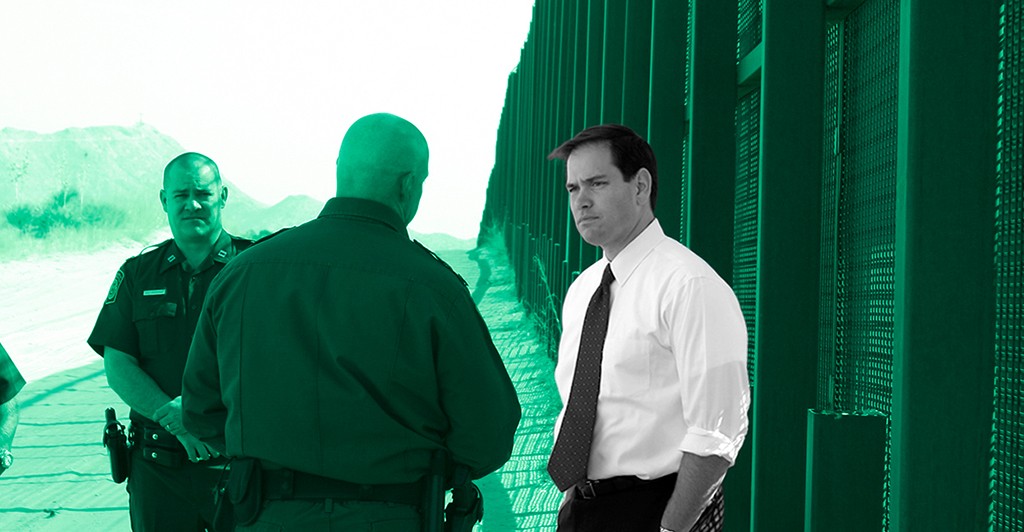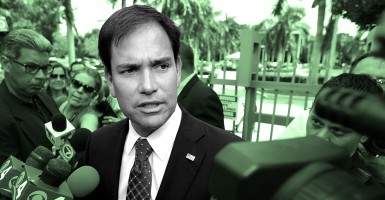Some conservatives wrote off Marco Rubio as a prospective candidate for president because of the Florida Republican’s work on, and advocacy for, the Gang of Eight immigration reform bill.
The first-term senator began to talk about that legislation as a mistake, though, as he moved toward his April 13 announcement that he was formally entering the race for the White House.
“What I’m saying to people is that we can’t do [immigration reform] in a massive piece of legislation.”–@marcorubio
Even so, he mentioned the immigration issue only once as he declared his candidacy at Miami’s Freedom Tower, a former immigrant-intake facility.
“If we reform our tax code, reduce regulations, control spending, modernize our immigration laws and repeal and replace Obamacare,” Rubio said about halfway through the speech, “the American people will create millions of better-paying modern jobs.”
“The thing that’s different with Marco is that he’s responded to criticism,” one close observer of policy battles in Congress for an outside group tells The Daily Signal.
Rubio’s problem, this person adds, is that he chose several years ago to make immigration reform his signature domestic issue.
Although not straining to bring up what to do about immigrants already in the country illegally, Rubio, who turned 44 this month, appears to be increasingly comfortable explaining why he decided they should wait longer before the government considers legal status for them.
In a May 1 appearance at a gathering of conservatives sponsored by the National Review Institute, the son of Cuban immigrants forcefully took on liberal activists who claim a “right” for immigrants in the country illegally to become citizens.
“There is no right to illegally immigrate anywhere in the world,” he told the crowd.
“What I’m saying to people is that we can’t do it in a massive piece of legislation,” Rubio said of reforming the immigration system and addressing the status of illegal immigrants in an interview with Bob Schieffer of CBS News that aired April 19 on “Face the Nation.”
He said Americans have a message for their public officials about the more than 12 million living here unlawfully: “We know we have to deal with this. We’re not prepared to deal with this until first you can prove to us that this will never happen again.”
Mark Krikorian, executive director of the Center for Immigration Studies, says he thinks Rubio has gotten closer to the mark but faces skepticism among conservatives because of his leadership role in promoting the Gang of Eight bill.
“The real question is, are we actually going to plug the hole in the boat before we start bailing it out?” Krikorian says in an interview with The Daily Signal.
With Wisconsin Gov. Scott Walker talking about possible new limits on legal immigration as he contemplates a White House bid, Krikorian says, Rubio and other hopefuls will need to specify whether they favor net increases in higher-skilled workers.
“He is going to have to be pressed on the issue, and we’ll see what he says.”
The word “immigration” does not appear in the policy agenda on Rubio’s official Senate web site. In the blog and commentary section of the site, he hasn’t mentioned immigration reform since April 17, 2013.
That’s a rough measure, perhaps, of when Rubio began to disassociate himself from the Senate bill that supporters called comprehensive immigration reform and opponents called amnesty for illegal immigrants.
As one of the so-called Gang of Eight in what was then the Democrat-controlled Senate, the Florida Republican co-sponsored, helped craft and promote, and ultimately voted for the bill when it passed 68-32 on June 27, 2013.
Billie Tucker, former head of the First Coast Tea Party in Florida, says she hasn’t lost faith in Rubio—and she isn’t alone.
“I will tell you from my observations that Marco Rubio is still a man of principle and conviction,” Tucker says in an interview with The Daily Signal.
She recalls Rubio calling several years ago to talk about his plans to focus on doing something for children unlawfully brought here by their parents, who “never knew anything else” but America. He wanted to know how tea party activists would react.
“I told him, ‘Marco, I don’t think people would be opposed to that if it was done right.’ These children shouldn’t be punished for what their parents did, but they shouldn’t get special treatment either,” Tucker recalls.
“He will have some people who will never forgive him, who expect people to be perfect. I still trust Marco. That is my personal opinion,” she says, adding: “I’m going to get all kinds of crap about that, but I don’t care.”
Also voting yes on the Gang of Eight bill were two of the four other senators in the presidential race, Republican Lindsey Graham of South Carolina and independent Bernie Sanders of Vermont. Among those voting no were Republicans Ted Cruz of Texas and Rand Paul of Kentucky.

In a 2013 tour of the southern border, Rubio talks with U.S. Customs and Border Protection officials. (Photo illustration by Nicole Rusenko for The Daily Signal; photo courtesy Marco Rubio Facebook)
The legislation proved dead on arrival in the House, where a significant portion of Republican lawmakers—some citing Obamacare—said they wouldn’t support an all-in-one bill that could move illegal immigrants toward citizenship without first ensuring border security, workplace compliance and enforcement of other immigration laws.
By October 2013, Rubio’s break from his own bill was clear.
He “had to be reasonable about what is achievable,” Rubio told the Wall Street Journal.
House Republicans did move several bills addressing aspects of immigration, although none was scheduled for a floor vote.
Interest in the Republican-controlled House then withered when President Obama went around Congress to take executive actions that would allow millions of illegal immigrants to stay and work here without fear of being deported.
By that time, Rubio rapidly had lost ground with grass-roots conservatives.
As one angry voter wrote in a typical comment on news accounts of the Senate action:
I contributed to Rubio’s Senate campaign and I regret it. … I will do all I can to defeat Rubio for any office that quisling runs for. He … lied through his teeth about his real position on amnesty in his 2010 campaign.
But another posted this comment on Rubio:
And why did FL [Florida] go to President Obama [in] 2012? He [Rubio] has earned my respect for taking a stand on something that is not popular with the immigration hawks in his party. This will get done. If it isn’t done this time the GOP will win a battle but will ultimately lose the war.
In the annual presidential preference poll conducted at the 2014 Conservative Political Action Conference, to take one measure, Rubio dropped from second to seventh place. He stayed there this year.
Some Rubio sympathizers blamed Cesar Conda, his chief of staff at the time, who last spring joined Reclaim America, the political action committee advancing Rubio’s White House bid. Conda was once a domestic policy aide to Vice President Dick Cheney.
Rubio’s underestimation of the blowback revealed that he perhaps wasn’t as engaged with tea party conservatives in Florida and elsewhere as he was depicted to be, Tea Party Patriots co-founder Mark Meckler says in an interview with The Daily Signal.
Meckler speculates that Rubio did not see an advantage in becoming too closely associated with the tea party movement in Florida, not only a swing state but one that is key to winning the White House.
How Rubio treats skeptical grass-roots activists could be “his win-or-lose move” as a contender for the presidency, says Meckler, now head of Citizens for Self-Governance.
“Rubio, far more than the other GOP candidates, will have to be much more specific with his immigration reform agenda to convince suspicious voters,” says Bob Dane, spokesman for the Federation for American Immigration Reform. “Simply saying, ‘We need to secure the border before anything else happens’ may be heard as ‘amnesty a little later’ rather than ‘amnesty never.’ ”
“@marcorubio …will have to be much more specific with his immigration reform agenda to convince suspicious voters.”—@FAIRImmigration’s Bob Dane
Rubio devotes eight pages to reform of the nation’s immigration system in his 195-page book “American Dreams: Restoring Economic Opportunity for Everyone,” couching the issue as part of “winning the global competition for investment and innovation.”
“We simply cannot remain competitive in the 21st century if we are unable to attract and keep the most talented people in the world,” he writes.
Then, noting the struggles of “so many working-class and middle-class families,” Rubio argues that advocating continued immigration reform doesn’t have to be at odds with helping those Americans—so long as policymakers reform a “chaotic” system.
He cites sectors of the border with Mexico that are not secure, immigration laws that “are simply not enforced or unenforceable,” and a family-based system of legal entry that is a “relic of the last century.”
He writes:
No nation on earth is more generous when it comes to immigration than America. Each year about 1 million people permanently immigrate here legally. But when people hear that we have over 12 million people here illegally, they feel as if we are being taken advantage of. They see how hard it is to find and keep a steady and well-paying job, and they worry that more people will mean more competition for already scarce work. That’s not nativism. That’s human nature.
Rubio argues that economic growth depends on a merit-based, high-skilled immigration system that works, in part by encouraging innovators and entrepreneurs to settle here. The holdup, he adds, is failure to address the nation’s 12 million or more illegal residents.
“We will never have the votes needed in Congress to modernize any part of our immigration system until the issue of illegal immigration is adequately dealt with first,” Rubio says in his book. Americans “simply don’t trust” politicians of either major party to move forward “before illegal immigration has been brought under control.”
Skepticism was fueled in early 2014 when parts of the southern border “essentially were overrun,” largely by unaccompanied children from Central America, he says, despite assurances that the border was “as secure as ever” from Obama, allies in Congress and advocates of immigration reform.
Obama’s executive actions to “ignore, suspend, rewrite or violate” the law cemented public mistrust of the administration and resulted in stalemate, Rubio writes.
Public mistrust and the backlash against his leading role in the Senate bill apparently convinced Rubio to renounce what he calls “comprehensive reform of anything in a single bill” as unrealistic.
“Having tried that approach, I know this to be true firsthand,” Rubio adds:
The fear that such massive pieces of legislation include some clever loophole or unintended consequence makes it even harder to achieve. The only way we are going to be able to break this impasse and make progress on this issue is in a sequential and piecemeal way, with a series of bills that build upon one another until ultimately we have put in place the kind of immigration system our nation needs.
He then lays out the necessary steps.
Step one: Exercise effective, verifiable enforcement, including “securing the most vulnerable and most trafficked” stretches of the border using more electronic monitoring as well as personnel; a “mandatory” E-Verify system that reliably allows employers to check the legal status of those they hire; and “full implementation” of an entry-exit tracking system designed to flag visitors who overstay visas.
Step two: Move to a merit-based legal immigration system by reassigning existing visas from family-based entries toward work- and skill-based entries; implementing reforms encouraging visas for high-tech workers; and creating a “guest worker” program for seasonal agricultural laborers.
Step three: Address the 12 million here illegally in a three-part process. First, they come forward to be registered and “will have to leave” if they “committed serious crimes” or “have not been here long enough” (Rubio does not specify).
Then, those who qualify are allowed to apply for a temporary nonimmigrant visa, which they can’t get until paying a fee and a fine, undergoing a background check and learning English. To keep the visa, Rubio says, they must pay taxes but “would not qualify for government programs like Obamacare, welfare or food stamps.”
Finally, visa holders have to retain that status “for at least a decade” before they are allowed to apply for permanent residency – “the way anyone else would, not through any special pathway,” Rubio writes.
The chronology Rubio outlines in this third step closely tracks provisions in the Senate bill; the difference is that he now insists border security and other enforcement measures first will be fully implemented—not just planned or budgeted.
How Rubio’s changed perspective on a sequenced response to the immigration challenge will play with voters is only beginning to be tested. The first GOP debates are months away, and the first primary and caucus voters even further.
For now, activists on both sides of the issue are watching. Two who spoke to The Daily Signal are with organizations that oppose a pathway to legal status for illegal immigrants and want to see what they consider sensible curbs on legal immigration.
“The take-away lesson for others,” FAIR’s Dane says, “is to listen to your constituents, approach immigration from the principled standpoint of what’s in the broad national interest and stick with it.”
“He’s rehabilitating himself. It’s a big hill to climb,” says Roy Beck, executive director of NumbersUSA, adding:
There’s a lot of distrust [but] I think also there is a real reservoir of interest among conservative Republicans for a fresh face. They’re fighting with him, but they like him. There’s a real desire among a lot of people for him to rehabilitate himself.

























